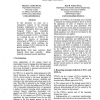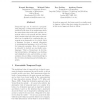45 search results - page 2 / 9 » Logical Consequence Inside Out |
ASP
2003
Springer
13 years 10 months ago
2003
Springer
It is commonly believed that the meaning of a formal declarative knowledge representation language is determined by its formal semantics. This is not quite so. This paper shows an...
EUSFLAT
2001
13 years 7 months ago
2001
In this document we cany out a comparative analysis of the reasoning strategies implemented in Fuzzy Logic Controllers (hereinafter FLCs) and Faded Temporal Fuzzy Logic Controller...
KR
1991
Springer
13 years 9 months ago
1991
Springer
Temporal logic can be used as a programming language. If temporal formulae are represented in the form of an implication where the antecedent refers to the past, and the consequen...
KI
2007
Springer
13 years 11 months ago
2007
Springer
Axiom pinpointing has been introduced in description logics (DLs) to help the user understand the reasons why consequences hold by computing minimal subsets of the knowledge base t...
CORR
2002
Springer
13 years 5 months ago
2002
Springer
Many systems that exhibit nonmonotonic behavior have been described and studied already in the literature. The general notion of nonmonotonic reasoning, though, has almost always ...


